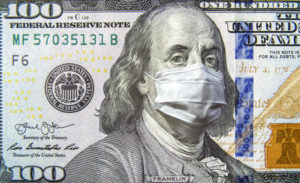
It can be a difficult time to understand the financial aspects involved in being an entrepreneur. We have put together a list of some programs and ideas to hopefully make this a bit easier.
So – if you’re worried about taking care of your employees, worried about more important things…we hope this helps!
#1 Paycheck Protection Program
The U.S. Small Business Administration (SBA) has $350 billion to support job retention and operating expenses.
The Paycheck Protection Program creates an emergency loan that can help small businesses retain a full workforce during COVID-19.
Who is Eligible?
- Small businesses with 500 or fewer employees
- 501(c)(3) Nonprofits with fewer than 500 employees
- Some 501(c)(19) veteran organizations
- Businesses with more than 500 employees that meet the SBA standards for their industry
- Sole proprietorships
- Self-employed individuals
- Independent contractors
- Private non-profit or 501(c) or Veterans organizations
Eligible businesses must have been operational on February 15, 2020.
How Much?
Small businesses may apply for a maximum loan of $10 million with no higher than a 4% interest rate.
To determine your income in most cases, collect your net income/W2, gather your annual health insurance costs and the amount that you have contributed to retirement.
Loan Forgiveness
SBA will forgive loans if all employees are kept on the payroll for 8 weeks, and 75% of the money is used for payroll while the rest can be used for rent, mortgage interest or utilities. This starts on April 3 and will be available through June 30, 2020.
How to Apply:
You will apply for the Paycheck Protection loan at your local bank.
View the application here
Terms:
- Loan payments are deferred for 6 months
- 2 year maturity at 1% interest rate
#2 Economic Injury Disaster Loans & Loan Advance
Economic Injury Disaster Loans are the SBA’s low-interest disaster loans given to small businesses experiencing a substantial economic loss due to a disaster.
Who is Eligible?
The CARES Act expanded eligibility for EIDLs to all small businesses in the U.S. affected by COVID-19.
How Much?
Eligible businesses may qualify for a loan of up to $2 million.
Emergency Loan Advance
You may also apply for an emergency loan advance of up to $10,000. If your application is accepted, these funds would become available within three days and would not have to be repaid.
How to Apply:
Businesses may apply for an EIDL and loan advance here.
Can you get a Paycheck Protection Loan and an EIDL?
Yes, as long as you are not using them for the same expenses. Talk to your financial advisor about the best option for your business.
#3 Business Tax Changes
In an effort to alleviate the strain on small businesses affected by COVID-19, the CARES Act has made specific changes to taxes and tax policy.
#4 Families First Coronavirus Response Act
The Families First Coronavirus Response Act (FFCRA) provides assistance to employees affected by COVID-19.
As a small business, this means new requirements for paid sick leave and paid family and medical leave (FMLA), as well as employer tax credits.
Read more about the FFCRA and what it means for small business here.
**Please contact your CPA about the employer tax credits**
#5 SBA Debt Relief
To help small businesses overcome the challenges of COVID-19, the SBA has implemented a debt relief program.
- Principal and interest will be paid for six months on current 7(a) loans
- Principal and interest will be paid on new 7(a) loans issued before Sept. 27, 2020
#6 SBA Express Bridge Loans
With an Express Bridge Loan, businesses may access up to $25,000 to ‘bridge the gap’ as you wait for your Economic Injury Disaster Loan application to process.
- You must have an established relationship with an SBA Express Lender to qualify
- This loan will be repaid through the EIDL
**Different banks have different rules, so you must call. Some are not accepting new business and only servicing past clients – while there are a few banks who will act so long as you have opened accounts**
#7 The Cares Act
Student Loans
- No federal student loan payments through September 30, 2020
- No interest on your federal student loan payments
- No garnishment of wages, SS and tax refunds for student loan debt collection
**Pausing will still result in you getting monthly payment credit regardless of what your servicer tells you**
#8 The Florida Small Business Emergency Bridge Loan Program
Who is Eligible?
How Much?
Small businesses can apply for up to $50,000 with interest rates at 12%, 1 year term, 1 loan per business and you must apply before May 8th, 2020.
Loan Forgiveness
All bridge loans must be paid in full.
How to Apply:
View the application here.
#9 For Your Employees:
Family Medical Leave Expansion
- Up to 12 weeks of certain virus-related family medical leave
- Business must have less than 500 employees
- Eligible employees are not working because they are caring for a child due to school closures, child care closures or unavailability
- Must have been employed at least 30 days
- Unpaid leave for the first 10 days, after 10 days the emergency leave becomes paid leave
- Employees to be paid to at least 2/3 of their regular rate of pay not to exceed $200 per day or $10,000 total
Emergency Paid Sick Leave Act
- 2 weeks of paid sick leave
- Employees not working because of quarantine, symptomatic, caring for an individual quarantined or child due to school closings or child car closings
- Businesses must have less than 500 employees
Other potential options for securing capital or saving money at the moment:
Bridge Loans:
Businesses with collateral can get a bridge loan even if the business is losing money.
Facebook Grants:
https://www.facebook.com/business/grants
Credit Card Processing:
If you take credit cards at your business we have an option for merchant processing. We have created a partnership with Priority Payments South Florida and created a program that will pass on the credit card fees to the consumer automatically. This has saved businesses everywhere from a few thousand to hundreds of thousands.
Insurance:
Check your insurance policy to see if it includes disruption insurance.
Landlord:
Contact your landlord or property manager if you have not already. They may be willing to work with you on your rent payments.
Stocks:
Non-recourse stock loans may be an option for you.
Home Equity:
Home equity lines of credit may be possible if you have enough equity in your home. You would need to talk to a lender about this option.
There are still a lot of moving parts with these programs/options and information is changing daily. So far we have not received guidance on the ins and outs of each program – for instance whether a business run out of your home would qualify for reimbursement of rent, how overlapping businesses may be handled, etc. The message here is it doesn’t hurt to try. Talk to us today about any of the options above and we may be able to help you decide which programs would be right for your particular circumstance.
Also – some banks are asking for a business valuation. Right now, due to the situation, we are doing these free of cost if needed. Simply send us 3 years of P&Ls and/or tax returns and we would be happy to provide this to you.
Life can and will return to normal. As a business owner you are more than acquainted with challenge and hardship – it’s the grit and determination of facing tough situations that makes you a successful entrepreneur. Don’t give up. Find creative solutions, programs you can utilize and plans to keep your business running as smoothly as possible during this unprecedented time. If you need help – ASK US! We know what you are going through and will assist you in every way we can. Reach out today, and stay safe out there.
Michael Monnot
941.518.7138
Mike@InfinityBusinessBrokers.com
12995 South Cleveland Avenue, Suite 249
Fort Myers, FL 33907
www.InfinityBusinessBrokers.com







